Nightdive Studios are masters of retro game remakes - this is how it's done
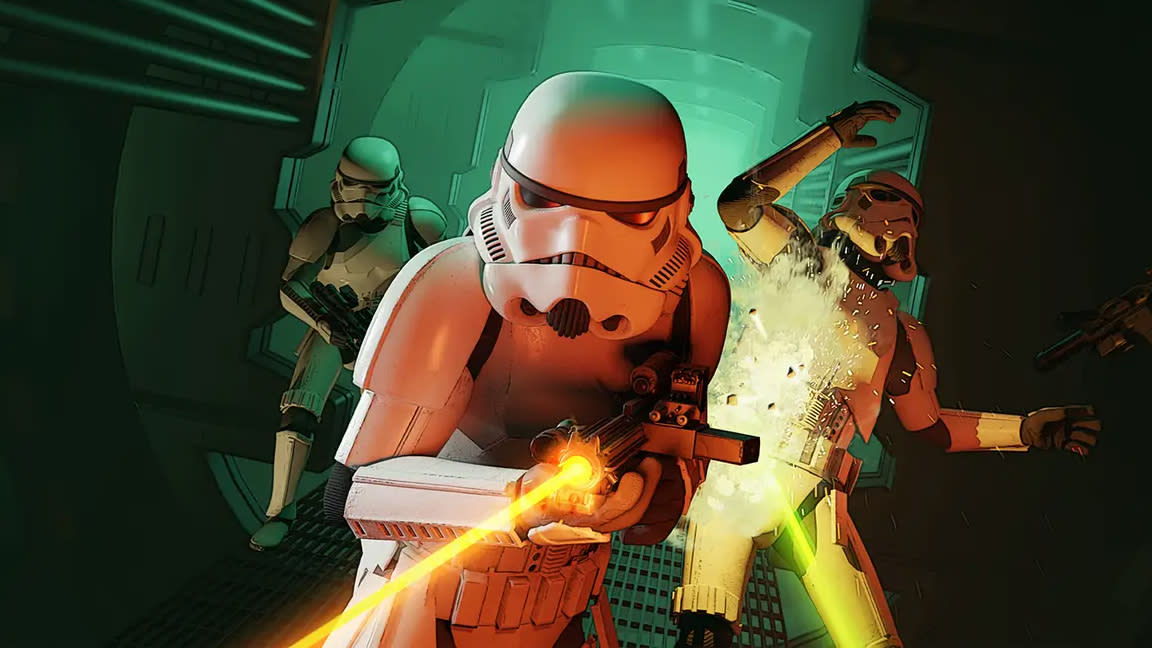
- Oops!Something went wrong.Please try again later.
Recently, I took a look at the best upcoming remakes and remasters, and one company that is globally renowned as an expert at both is Nightdive Studios. Formed in 2012, the firm has been behind well-received remasters of games like Quake, Blade Runner, Doom 64, Turok and the upcoming Star Wars: Dark Forces, and in 2023 it launched a loving remake of the seminal 1994 immersive sim System Shock.
Many of these games release for the best games consoles and some on the best retro consoles. So what's the secret to crafting a video game remaster? I caught up with the Nightdive Studios members Stephen Kick, Samuel Villarreal, Justin Khan and Max Waine to find out.
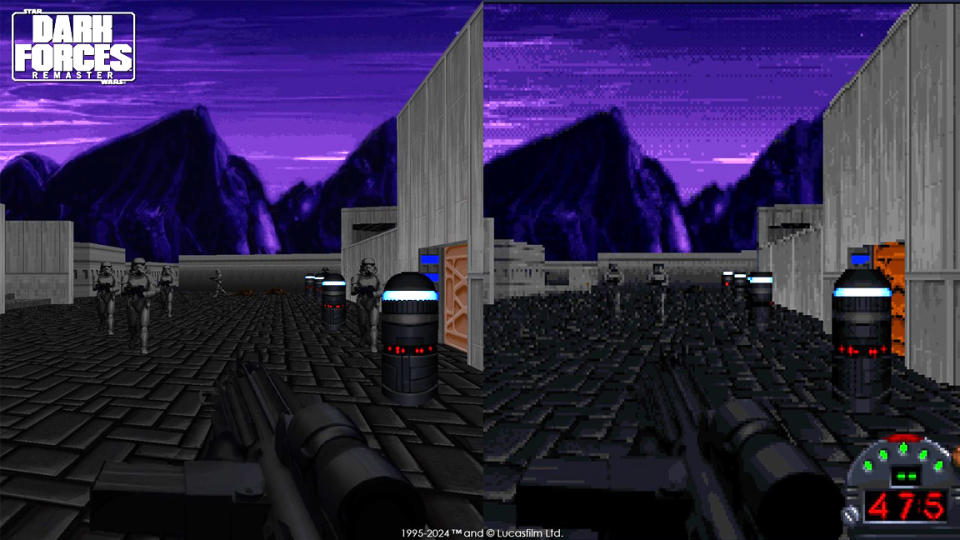
"It's not always a simple, straight process," says software engineer Samuel Villarreal of making decades-old games run on modern machines. "It's actually a lot more work than it seems." He adds that getting Star Wars: Dark Forces, a game built around DOS, to work on modern 64-bit platforms was far from easy. "There were a lot of things that had to be redone, a lot of code that needed to be rewritten," he says.
The majority of Star Wars: Dark Forces was written in assembly, a low-level programming language that directly instructs the machine to, say, move a few bytes from one place to another. But it's an arcane script, a code that's impenetrable to most modern programmers, who are used to writing in high-level languages like C++ or Java.
Reviving Star Wars: Dark Forces involved a kind of digital archaeology, with skilled people like Samuel interpreting these ancient runic texts and translating them into a language modern computers can understand.
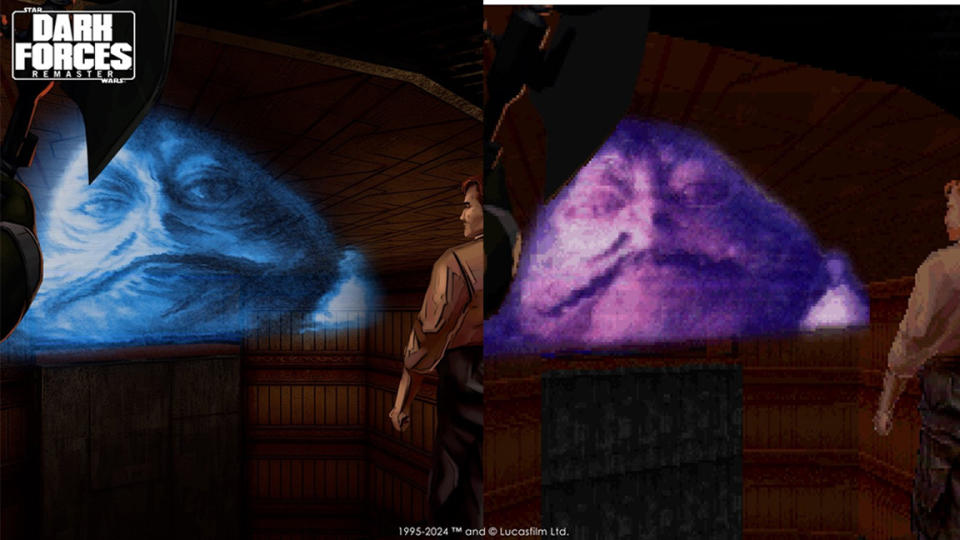
It could have been worse, however. At least Nightdive Studios had access to the original source code for Star Wars: Dark Forces, which certainly wasn't the case for the studio's remaster of Turok 3. That game had to be reverse engineered from scratch, a process that took around a year and a half.
Still, the process can be rewarding, thinks Samuel, and he finds it fascinating to discover the individual ways in which each of these old games were made. "Nowadays, everything is done through engines like Unreal and Unity," he says, "but back then, when it was still the wild west of game development, every developer had their own unique way of solving problems."
The KEX Engine for game remakes
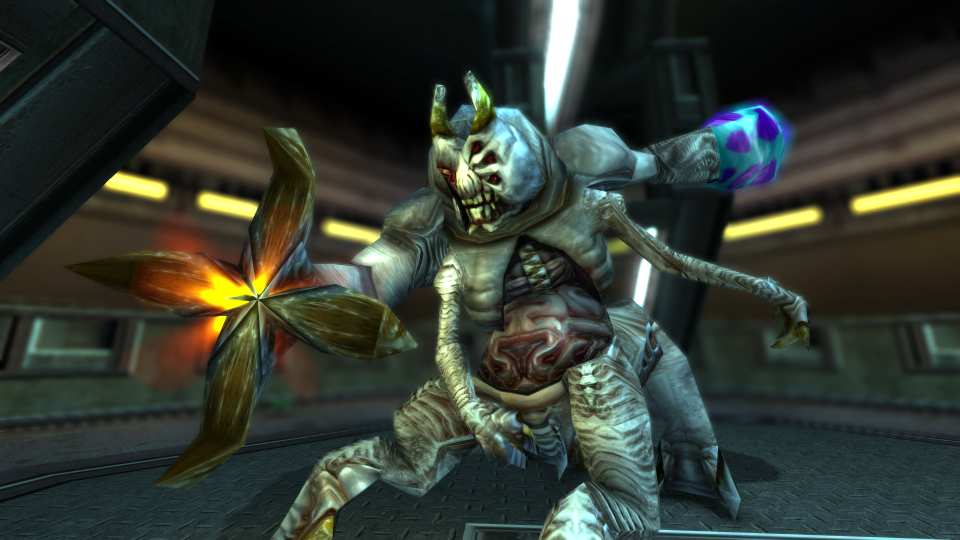
Nightdive Studios' remasters are created using the KEX Engine, something that Samuel began creating around a decade ago while attempting to reverse engineer the original Turok as a hobby before joining the studio.
"I started to make this framework to help speed things up with development," he says, "and eventually, this framework became KEX. It's not essentially a game engine, but rather it's a very generalised framework to speed up development. So it only includes all of the low-end platform-related stuff like input, rendering, audio and whatnot, and then you develop the actual game on top of that."
Samuel likens it to the cross-platform development library SDL (Simple DirectMedia Layer), and adds that KEX is now used on every Nightdive Studios project, and is constantly being improved.
Game remakes are a delicate balance
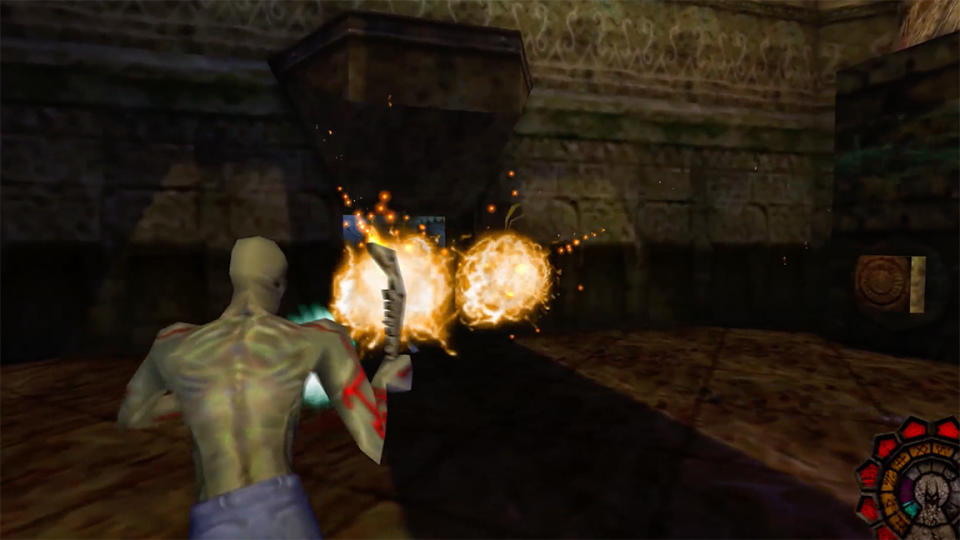
There's one big question when it comes to making a remaster: how much do you change? Max Waine, the project lead for the Star Wars: Dark Forces remaster, says the answer to this varies from game to game.
In Star Wars: Dark Forces, for example, Max says the controls were mostly left alone, although the default settings were changed to the now-standard WASD keys. In other cases, the controls get a complete overhaul.
"Shadow Man was definitely the type of game that really needed improved controls," notes Samuel, who says he had a hard time just moving the character around when going back to the original. As such, the controls were completely reworked for Nightdive Studios' Shadow Man Remastered in 2021, although there's still the option to switch back to the classic control layout. Generally, says Samuel, the rule is that if the developer plays the original game and the controls feel fine, then they would only receive minor fine tuning.
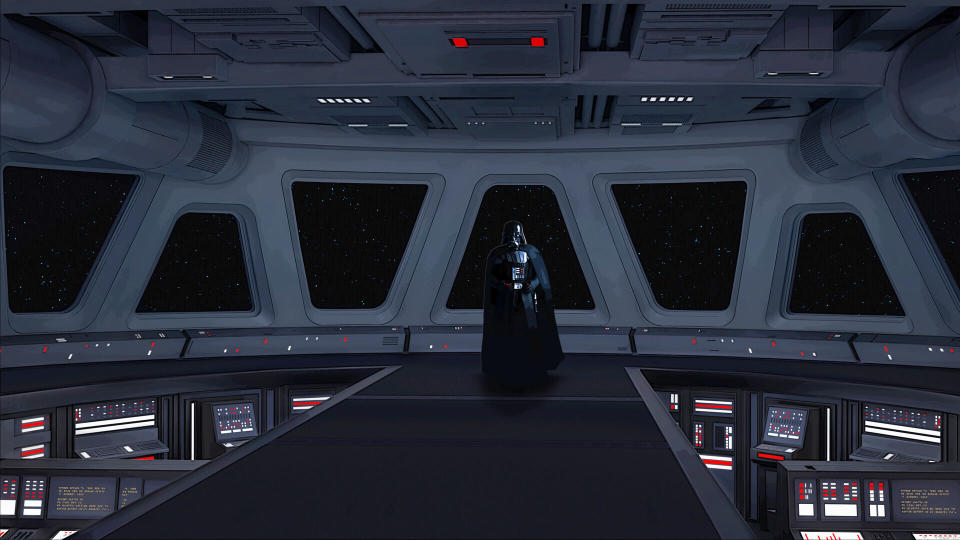
But the graphics are another matter, and getting decades-old sprites and polygons to look passable on modern high-definition screens is a big task. For Star Wars: Dark Forces, Max says a lot of thought was put into carefully updating the textures. "It's very much a delicate balance of remaining faithful to the original while sanding down some of the rougher edges," he says.
The memory plays tricks, and players going back to early 3D games like Dark Forces are likely to be surprised at just how crude they look now. The aim, then, is retain the original aesthetic while making it more acceptable to modern eyes. Max tells me that Nightdive Studios' director of business development, Larry Kuperman, describes it as delivering games as people remember them, rather than how they actually were – although Nightdive Studios always add the option to switch over to the original graphics at the touch of a button.
The use of AI for upscaling
Nightdive Studios sometimes uses AI upscaling to update old low-res graphics, although Samuel notes it's something they try to avoid. "A lot of our artists do it from scratch, and if possible, they also try to find the source material for some of the texture assets," he says.
On Turok 3, for example, Samuel explains how "a lot of the source material was what was used to make the enhanced texture upscaling for the remaster, and then there are some textures that were touched up by hand."
Max adds that an artist is always involved. "Even if you're upscaling with AI, you have to have an artist there to oversee the process," he says. "Otherwise, the results are not going to be good enough."
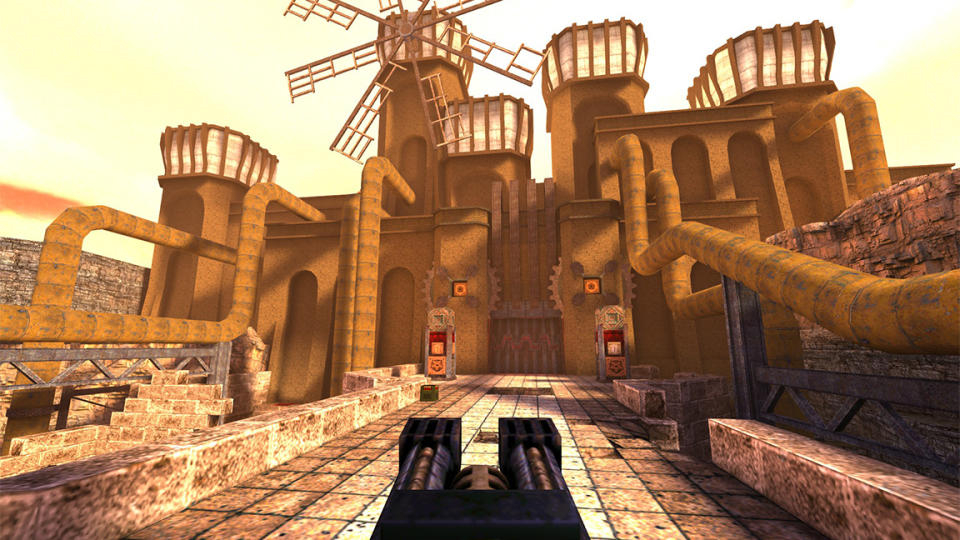
There's also a skill in knowing when to stop. "It's very important to maintain the core aesthetic of the original game," says Max. "If the game looks pretty crunchy and pixelated, then you can maybe scale the sprites by two times, but if you keep going further and further beyond, it begins to become unrecognisable from the original, which I don't think is something any of us want."
Nightdive Studios' CEO Stephen Kick says that the 2021 Quake remaster was the first title where the studio brought in a team of artists to go over all of the assets and give them an extra level of polish. "We had Kevin Cloud, one of the original developers, looking over our shoulder to make sure we didn't push things too far," he says. "And what ended up happening was the game came out and a lot of people didn't even notice the work that we had done. And I think that was the highest compliment that we could possibly receive."
When is a remaster a remake?
In the case of System Shock, Nightdive Studios originally released a remaster in 2015, but then decided to completely remake the game. Producer Justin Khan says the decision to do a remake was based on the fact that the title is a seminal one in the immersive sim genre that has a story that's still relevant today, but the stilted interface of the original is somewhat inaccessible and archaic, especially for younger players.
Justin says: "How do you go to a ten year old now and say, here's this pixely game where you have to toggle between looking around and clicking on things?" Adding: "It's a language that they just don't speak."
Stephen says that they approached the project with the idea that the foundation of the game, such as the level design, story and characters, would be kept essentially the same, but that the gameplay would be completely overhauled to appeal to a modern audience.
"You're using the original game as effectively a blueprint," says Justin. "You're not taking original assets or code or anything like that. It's just looking at it and being like, 'Alright, what makes sense and what doesn't?’. Let's change this to what modern gamers would expect." For example, notes Justin, that in the original System Shock, headshots on enemies didn't cause any extra damage, and damage was in fact calculated by a virtual dice roll behind the scenes.
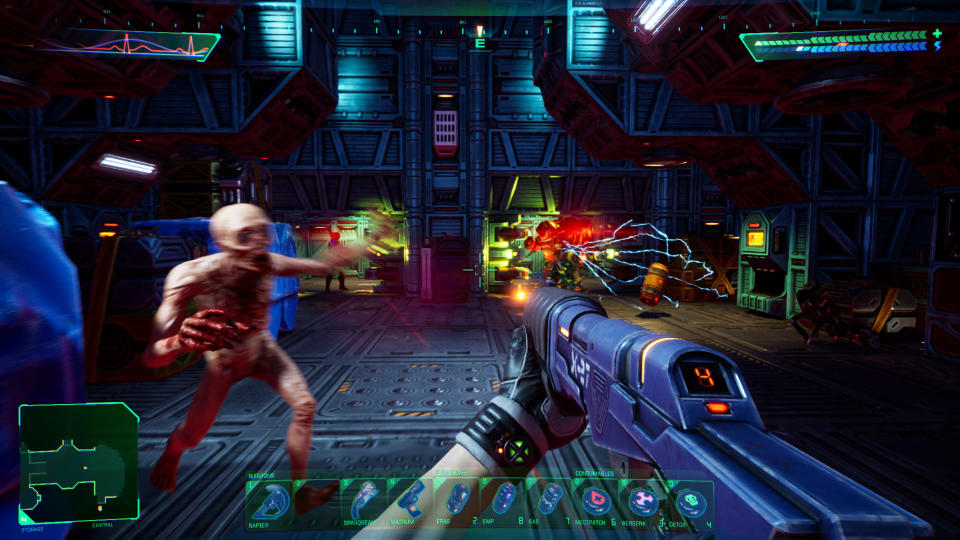
However, remaking someone else's game is a tricky balancing act, with the potential to raise the ire of not only fans, but also the original developers. "One of the first things that we did is we reached out to Warren Spector and Paul Neurath, who were integral in the development of the original, and we got them on board as early consultants so that they could check in on our work as we went along," says Stephen.
Robb Waters, one of the original artists, was also brought in to redesign some of the game’s art and Stephen reveals why other people involved in the original game were called upon. "The other thing was getting Terri Brosius on board to help us out by providing her iconic voice as SHODAN. That was almost one of those make or break things, where if I wasn't able to get her, I'm not sure we would have even bothered making the game," he says.
But completely remaking System Shock from scratch turned out to be a much taller order than Nightdive Studios' typical remasters: Stephen notes that development lasted seven years in total. "It took a lot longer than we anticipated and a lot more money," he says. "But what we ended up with at the end was extraordinary."
Raising the bar
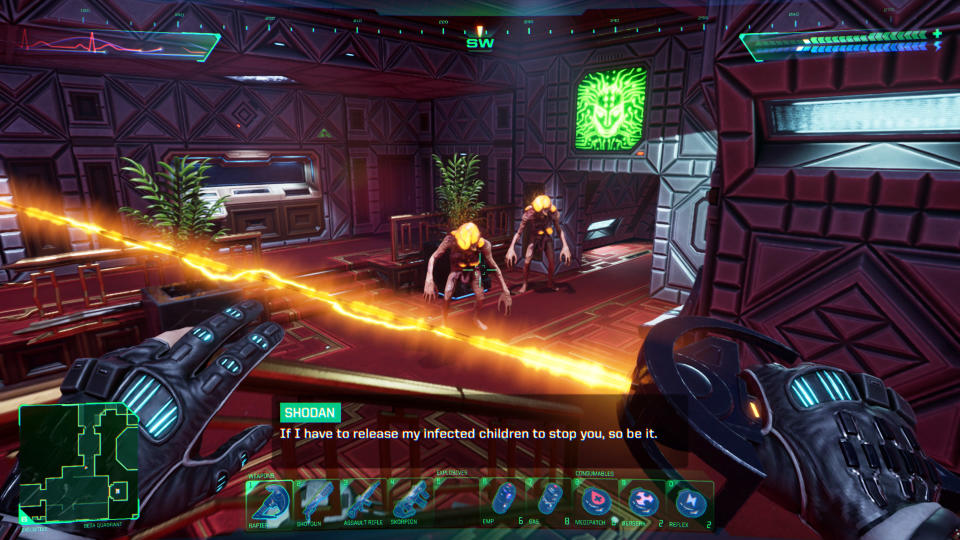
The stakes are constantly being raised in the remaster sector, it seems, with titles like Atari 50 and The Making of Karateka including documentaries that provide detailed information about the background to the games.
"The work that Digital Eclipse did on Atari 50 really opened our eyes," admits Stephen, adding that Nightdive Studios' Star Wars: Dark Forces Remaster includes a 'vault' showcasing unseen development assets, concept art and even levels that didn't ship with the original. Atari purchased both Nightdive Studios and Digital Eclipse in 2023, and the two Atari stablemates now operate a friendly rivalry. "We're pushing each other," says Stephen, "and that's great."
Nonetheless, Max thinks that remasters don't necessarily have to come with bells and whistles such as cut levels and documentaries. "I think if we were to do a smaller title, maybe something like more of a cult classic, I think simply providing that to a wider audience would probably be enough," he says.
As for Nightdive Studios' future, Stephen says that the remake team is busy working on its next project. "You could take a wild guess what that might be," he smiles. "And as for the KEX Engine team, we've got a couple of surprises, a couple of games that you would definitely not expect to see."

